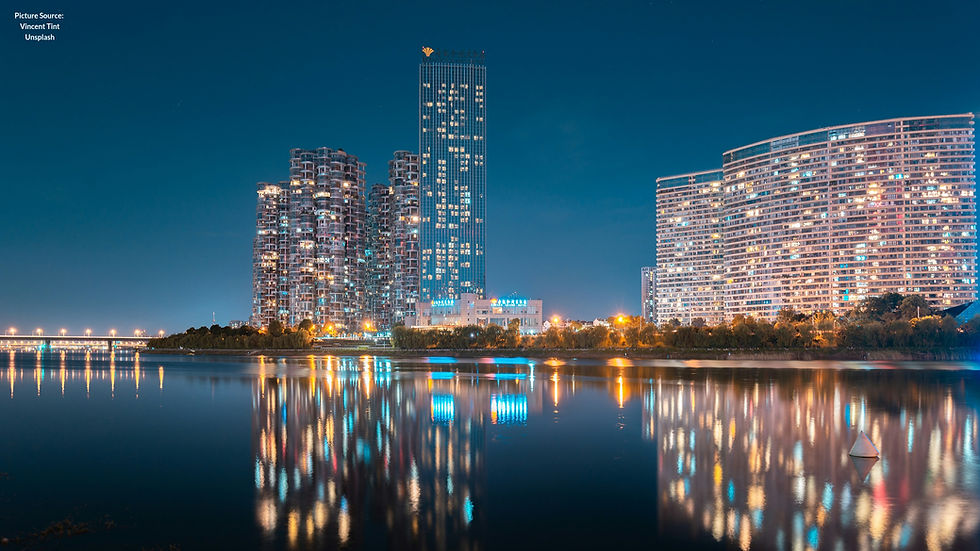Why Black Folks Don't Vote? Population Transfer and Political Suppression: The Impact of Gentrification on Black Communities That Causes Lower Voter Turnout by Black Americans by Design
- Karen Brittingham-Edmond

- Jul 28, 2025
- 8 min read
July 27, 2025
By Karen Brittingham-Edmond

The ongoing controversy surrounding the role of Black citizens in the election of Donald Trump has sparked significant debate, particularly among financially supported Black Liberal Media voices. Their argument of blaming Black voters for Trump's successful election as the President of the United States twice uses a strategy to deflect responsibility from the non-Black voter blocs whose political interests have historically collaborated with racist organizations, such as the Southern Evangelical "Sanctuary Movement." This collaboration has aimed to disenfranchise Black Americans deliberately. That in turn causes psychological trauma to long-term Black citizens who see voting as an illogical or hopeless venture to obtain justice plus reparatory resources owed to them and their ancestors who endured the horrors of chattel slavery, Jim Crowism, mass discrimination, plus police brutality.

Since the late 1960s, following the assassination of Rev. Dr. Martin Luther King Jr., there has been a marked increase in the influx of non-citizen populations into North America, primarily driven by White and Hispanic evangelicals and non Black minorities in North America. This insourcing can be seen as a form of population transfer, akin to actions condemned under international humanitarian law, particularly in terms of altering the demographic makeup of historically Black American communities.
Research, such as the study "Displaced by Design: Fifty Years of Gentrification and Black Cultural Displacement in US Cities," highlights how systemic racism and gentrification have led to the displacement of Black communities over the last fifty years. Framed as urban renewal, these initiatives have eroded Black cultural identity, economic stability, and political power. The study traces these issues back to the 1960s and the emergence of the Southern Evangelical movement, which aimed to undermine the Civil Rights Movement by deliberately altering the demographics of Black neighborhoods. (Displaced by Design: Fifty Years of Gentrification and Black Cultural Displacement in US Cities Data, Charts, and Graphs click the link https://ncrc.org/gd/)
Legally, the actions of groups like the Christian Coalition raise substantial concerns. Under international law, particularly the Fourth Geneva Convention, the manipulation of demographics through population transfer is prohibited. Domestically, these practices violate the constitutional rights of Black citizens, hindering their ability to participate fully in democracy. The insourcing of non-citizens not only suppresses voter participation but also reinforces systemic racism by purposely altering the voting bloc of Black citizens of North America and their political power.
Furthermore, gentrification has significant psychological and social ramifications for long-term Black residents. The arrival of preferential, often non-Black populations increases housing costs and contributes to cultural alienation, leading to feelings of loss and hopelessness. This alienation can result in disengagement from civic duties, such as voting, perpetuating a cycle of disenfranchisement and powerlessness within Black communities.
The ongoing narrative surrounding Black voter disenfranchisement amidst gentrification underscores a pressing call for reparations and systemic reforms aimed at reinstating dignity and civic engagement among Black citizens. It is crucial not to deflect attention toward the reasons why over 40 million Black citizens chose not to support a Confederate sympathizer like Trump. Furthermore, while Vice President Kamala Harris possesses many commendable qualities as a candidate, her Middle Eastern heritage brings complexities to the discussion.

Historically, the civil, human, housing desegregation, and affirmative action rights that have benefited certain groups often came at the expense of Black citizens, who have had to navigate the realities of overt racism. Many individuals from Middle Eastern and Latinx backgrounds identify as White on census forms, presenting an illusion of privilege that rarely reflects the lived experiences of Black citizens. Kamala Harris stands out as an exception rather than a rule in a world where insourced populations from these backgrounds frequently display a disregard for the struggles of Black Americans. And they come to America as if Black citizens owe them something when Black citizens owe them nothing.
This trend perpetuates a dangerous narrative where unearned privileges and resources—often allocated to communities that have not faced the same historical injustices—come at the expense of the very people whose ancestors tirelessly fought for equitable rights. The legacy of those struggles demands that we honor the contributions of all Black Americans and commit to addressing these injustices head-on. And not be the joyful bearer of bad news as a result of 50 years of trauma, and then ask "why didn't Black people vote as a result of long-term treasonous activity between White Supremists and their faithful caste system allies. (Black citizens aren't stupid, they're just tired of being stolen from and, in turn, didn't vote. )

As Black American Journalists, we must advocate for the rights of Black citizens plus expose why the humiliating effects cause Black citizens not to vote! Whether said cause is by means of bad advice or psychological trauma. As mature adults, we must recognize the importance of solidarity in the fight against systemic racism and for true reparative justice. So let's take a closer look at the facts
The disenfranchisement of Black voters in the United States is a deeply entrenched issue, rooted in systemic racism, historical injustices, and deliberate socio-political strategies. This commentary examines how unpaid reparations, gentrification, and systemic displacement have contributed to low voter turnout among Black citizens Drawing from the study by Mitchell, B. C., Edlebi, J., Meier, H. C. S., Richardson, J., Dean, J., & Chen, L. (2025), Displaced by Design: Fifty Years of Gentrification and Black Cultural Displacement in US Cities (NCRC, 2025), this analysis highlights the legal, historical, and psychological dimensions of this ongoing crisis that causes lower voter turnout. https://ncrc.org/gd/
Historical Context: Systematic Displacement and Racism
The study Displaced by Design provides a comprehensive analysis of how gentrification has systematically displaced Black communities over the past five decades. This displacement, often framed as urban renewal, has led to the erosion of Black cultural identity, economic stability, and political influence. The deliberate targeting of Black neighborhoods for redevelopment has not only uprooted families but has also disrupted the social fabric of these communities.
The roots of this systemic displacement can be traced back to the 1960s, when the Southern Evangelical "Sanctuary Movement" emerged as a covert strategy to undermine the Civil Rights Movement. This movement, which later evolved into the Christian Coalition, orchestrated the mass insourcing of non-citizen populations to dilute the political power of Black citizens. By altering the demographic composition of historically Black communities, these entities effectively weakened the voting power of Black citizens, a strategy that persists to this day.
Legal Implications: Violations of Domestic and International Law
The actions of the Christian Coalition and its affiliates raise significant legal concerns. Under international law, particularly the Fourth Geneva Convention (GCIV,) the practice of population transfer—where an occupying power moves its civilian population into occupied territory—is prohibited. This principle aims to prevent demographic manipulation and safeguard the rights of indigenous people and their long-term descendants, such as Black citizens and, for example, those with American citizenship.

Domestically, these actions violate the constitutional rights of Black citizens, including their right to equal protection under the law and their ability to participate fully in the democratic process. The deliberate insourcing of non-citizen populations to displace Black voters constitutes a form of voter suppression, undermining the fundamental principles of democracy.
The Psychological and Social Impact of Gentrification

Gentrification has profound psychological and social effects on long-term Black residents. The influx of preferential, often non-Black populations into historically Black neighborhoods leads to rising housing costs, cultural alienation, and a sense of loss. These changes foster feelings of depression, hopelessness, and disillusionment, which can manifest as disengagement from civic responsibilities, including voting. Black citizens continue to witness repeated injustices against their community, prominently displayed on television. A recent incident involves Mr. William McNeil Jr., who was attacked by police officers and involved in a car wreck caused by additional officers. This occurred after he was stopped for driving during the daytime without headlights, despite it not being required by law as it was not raining. When Mr. McNeil questioned the rationale behind the stop and requested to speak to the officer's supervisor, the situation escalated. This incident highlights the extreme violence present in this racially charged encounter. That also reveals that the three police officers who pulled up to harass McNeil Jr didn't have their police headlights on during the day while it was not raining.
The preferential treatment given to "insourced groups" exacerbates these feelings of marginalization. When local governments prioritize the needs of new residents over those of long-standing Black citizens, it deepens the divide and reinforces the perception that voting is futile. This cycle of disenfranchisement is both a cause and a consequence of systemic racism, perpetuating a sense of powerlessness among Black communities.
Reparations: A Path Toward Justice and Empowerment
The call for reparations is not merely a demand for financial compensation but a recognition of the historical and ongoing injustices faced by Black citizens. Reparations would address the economic disparities created by slavery, segregation, and systemic racism, providing Black communities with the resources needed to rebuild and thrive. Moreover, reparations would serve as a tangible acknowledgment of the harm caused by policies that have systematically undermined Black political power and cultural identity.
The Role of Media and Political Narratives
The role of Black media in shaping public opinion and political narratives is not to be overlooked. However, some Black media outlets, influenced by private and political donations, have perpetuated narratives that blame Black citizens for political outcomes, such as the election of Donald Trump. This deflection of responsibility ignores the systemic factors that have disenfranchised Black voters and shifts the focus away from the entities and policies that have perpetuated these injustices.
Conclusion: Accountability and the Path Forward
The disenfranchisement of Black voters is not an accidental byproduct of systemic racism but a deliberate strategy designed to undermine their political power. The actions of entities like the Christian Coalition, which have manipulated demographics and suppressed Black voting power, must be addressed through legal and policy reforms. Reparations, equitable urban planning, and inclusive governance are crucial steps toward rectifying these injustices and empowering Black communities to participate in the democratic process fully.

As we reflect on the findings of Displaced by Design and the broader historical context, it is clear that the fight for justice and equality is far from over. Black citizens, despite facing immense challenges, continue to advocate for their rights and demand accountability from those who have perpetuated their disenfranchisement. The path forward requires a collective commitment to addressing the root causes of systemic racism and ensuring that all citizens, regardless of race, have the opportunity to thrive and participate fully in society. And not to point the finger at Black citizens for their feelings of hopelessness, but instead expose the actual culprits that make being Black in America so dam hard, especially when our Black educated community bows down and joins in the heckling of long-term wounded and stolen from Black Americans, which is a cowardly thing to do.
One more thing, just because a portion of Black citizens did not vote does not mean that they will not fight, so don't let the smooth taste fool you.


Recap Reference Points:
Negative Effects:
Displacement of Residents and Businesses:
Rising rents and property taxes can force out low-income residents and small businesses unable to afford the increased costs.
Loss of Affordable Housing:
Gentrification often reduces the availability of affordable housing options, making it difficult for low-income individuals and families to remain in the neighborhood.
Increased Cost of Living:
Not only housing costs, but the overall cost of living in a gentrified area can increase, making it difficult for some residents to make ends meet.
Economic Stress and Inequality:
Gentrification can exacerbate economic inequality, as long-term residents may not benefit from the increased economic activity and face financial strain.
Cultural Erosion:
The influx of new residents with different backgrounds can lead to a loss of the neighborhood's unique cultural identity and social fabric.







Comments